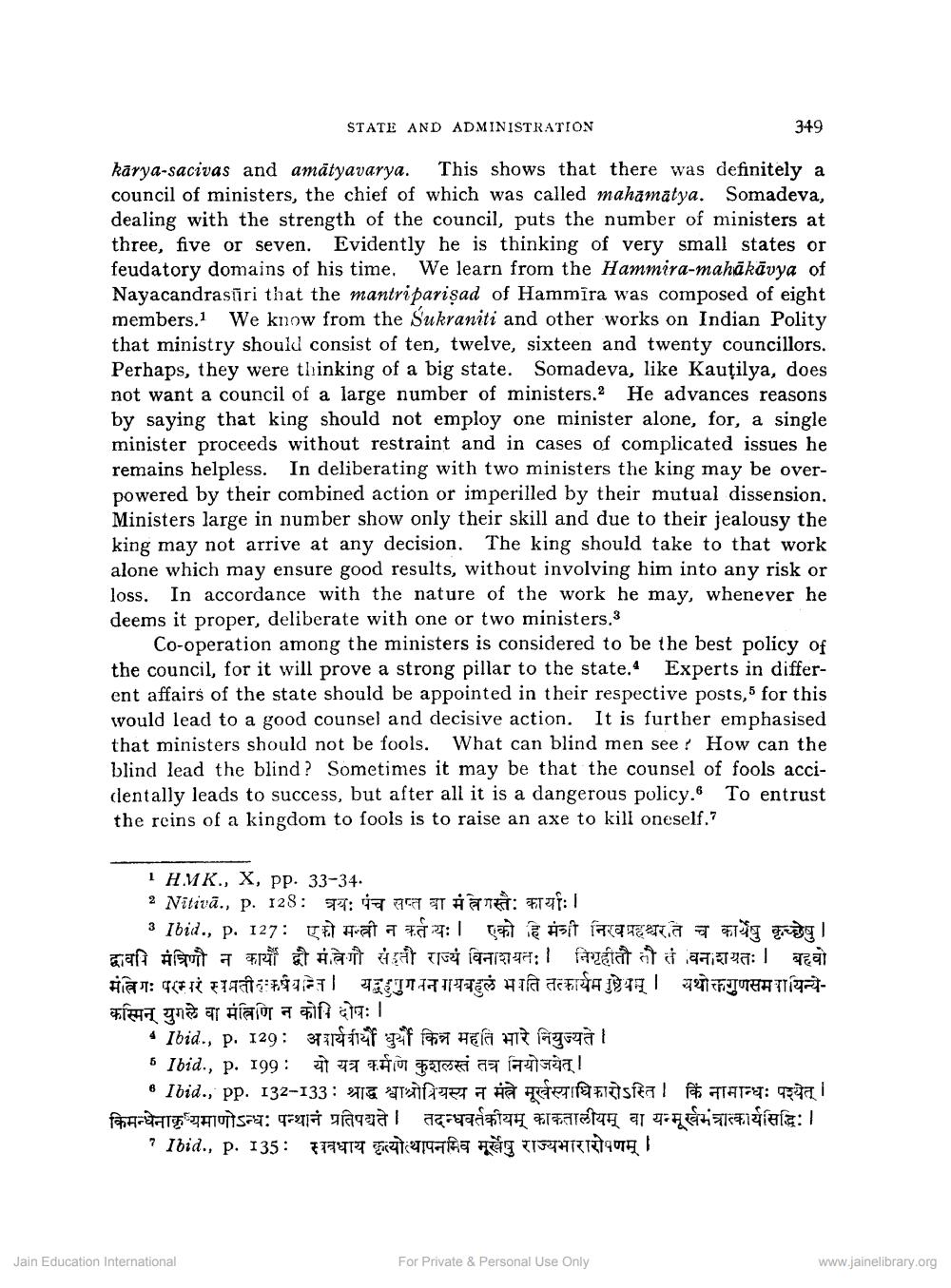________________
STATE AND ADMINISTRATION
349
karya-sacivas and amātyavarya. This shows that there was definitely a council of ministers, the chief of which was called mahamatya. Somadeva, dealing with the strength of the council, puts the number of ministers at three, five or seven. Evidently he is thinking of very small states or feudatory domains of his time. We learn from the Hammira-mahākāvya of Nayacandrasīri that the mantriparişad of Hammīra was composed of eight members. We know from the Sukraniti and other works on Indian Polity that ministry should consist of ten, twelve, sixteen and twenty councillors. Perhaps, they were thinking of a big state. Somadeva, like Kautilya, does not want a council of a large number of ministers. He advances reasons by saying that king should not employ one minister alone, for, a single minister proceeds without restraint and in cases of complicated issues he remains helpless. In deliberating with two ministers the king may be overpowered by their combined action or imperilled by their mutual dissension. Ministers large in number show only their skill and due to their jealousy the king may not arrive at any decision. The king should take to that work alone which may ensure good results, without involving him into any risk or loss. In accordance with the nature of the work he may, whenever he deems it proper, deliberate with one or two ministers.3
Co-operation among the ministers is considered to be the best policy of the council, for it will prove a strong pillar to the state. Experts in different affairs of the state should be appointed in their respective posts, 5 for this would lead to a good counsel and decisive action. It is further emphasised that ministers should not be fools. What can blind men see? How can the blind lead the blind? Sometimes it may be that the counsel of fools accidentally leads to success, but after all it is a dangerous policy. To entrust the reins of a kingdom to fools is to raise an axe to kill oneself.?
1 HMK., X, PP. 33-34. 2 Nitivā., p. 128: 77: 179 T Å TT: FT71:1 3 Ibid., p. 127: That 70:1
st Acta द्वावनि मंत्रिणौ न कार्यों द्वौ म.ले गौ संहती राज्यं विनाशयतः। निगृहीतौ तौ तं वनाशयतः | बहवो मंत्रिगः परम्परं समतीकर्षयान्न। यद्गुगतनायबहलं भाति तत्कार्यम पुष्ठेयाम् | यथोक्तगुणसमायिन्येकस्मिन् युगले वा मंत्रिणि न कोशिदोषः ।
* Ibid., p. 129: 3777f pf 1977 hela 17 aguai 6 Ibid., p. 199: 17 70
! 6 Ibid., pp. 132-133: 916 m GT - Hà HETI ETSIAI PASTATTET: 450 i किमन्धेनाकृ यमाणोऽन्धः पन्थानं प्रतिपद्यते। तदन्धवर्तकीयम् काकतालीयम् वा यन्मूर्खमंत्रात्कार्यसिद्धिः।
? Ibid., p. 135: F77977 T h a TOT TIPUHTEISTOT
Jain Education International
For Private & Personal Use Only
www.jainelibrary.org




